Key takeaways:
- Pro-life advocacy emphasizes empathy and support for women facing unexpected pregnancies, highlighting the importance of understanding and community resources.
- Abortion legislation varies significantly across regions, creating confusion and emotional strain for women navigating their choices within legal constraints.
- Personal stories and community collaboration are crucial for effective advocacy, enhancing understanding and connection while combating misinformation.
- Building a robust support network and addressing challenges with calmness and education are essential strategies for effective advocacy in the face of opposition.
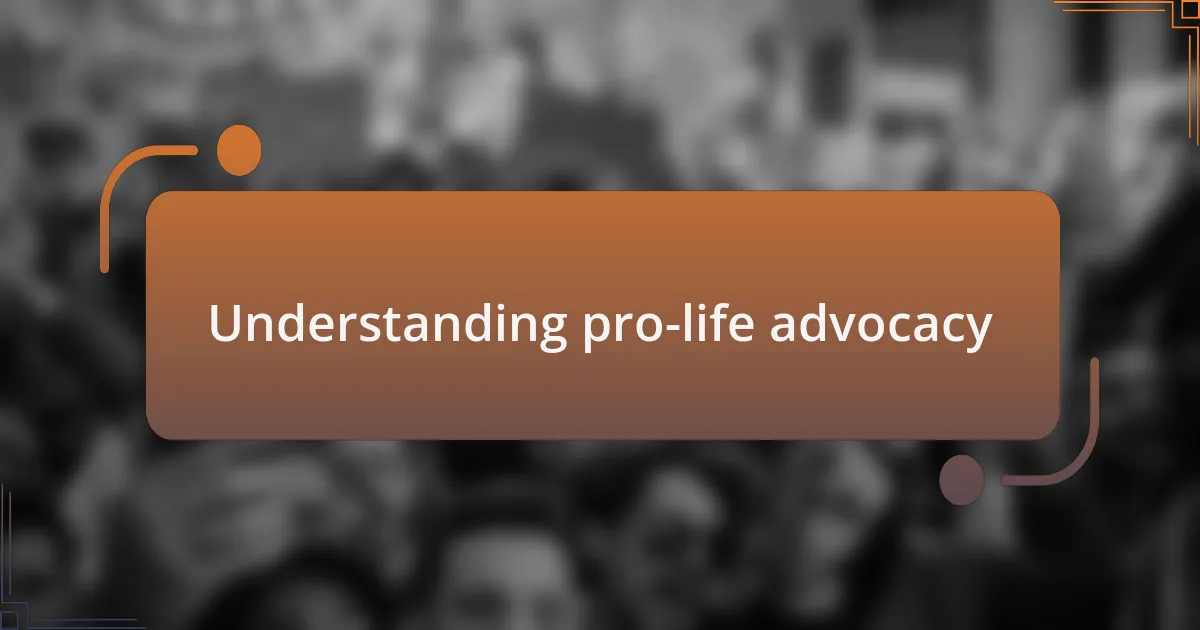
Understanding pro-life advocacy
Pro-life advocacy centers on the principle that every life, from conception to natural death, holds inherent value. In my own journey, I’ve met people whose stories deeply resonate with this belief—individuals who faced challenging pregnancies yet chose to see the beauty in their situations. This conviction isn’t merely a political stance; it’s a heartfelt commitment to protect the vulnerable.
One of the core tenets of pro-life advocacy is empathy. When I think about the women dealing with unexpected pregnancies, I often wonder, how do they navigate these emotional waters? For many, the fear and uncertainty can feel overwhelming. I believe it’s essential to offer not just support but also understanding, creating an environment where they feel loved and heard rather than judged.
Moreover, I’ve come to realize that pro-life advocacy isn’t solely about opposition to abortion; it encompasses a broader discussion about life-affirming alternatives. For instance, I have seen firsthand the power of community resources that provide options like counseling and financial aid. Isn’t it fascinating how a supportive network can transform a challenging situation into one of hope and empowerment?
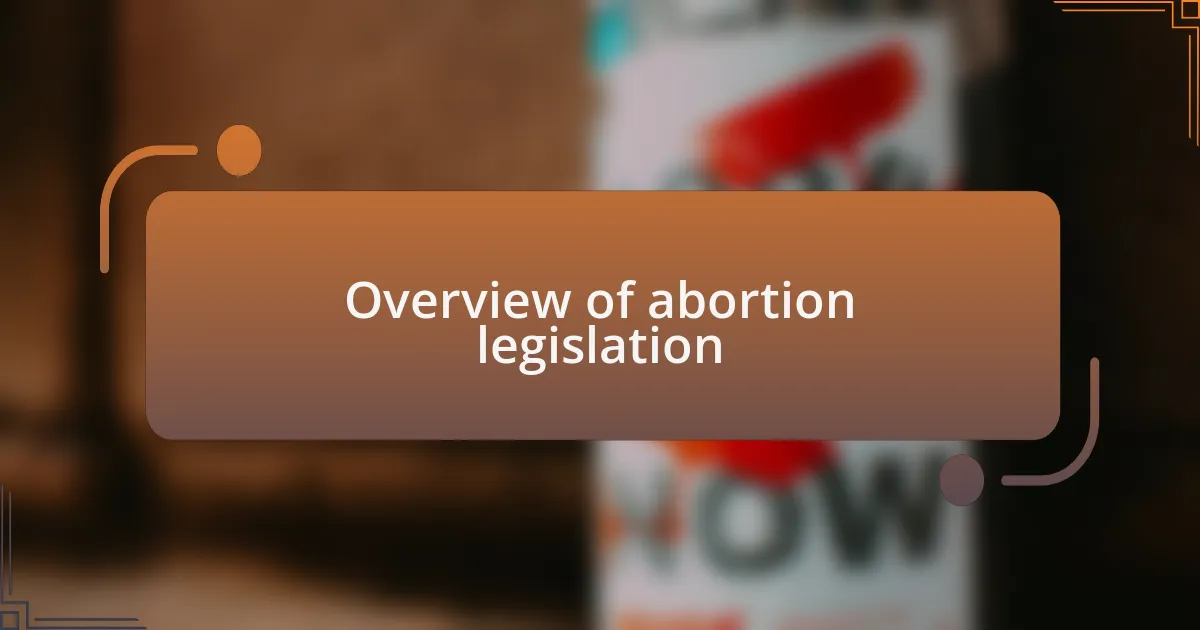
Overview of abortion legislation
Abortion legislation varies widely across different regions, reflecting diverse societal values and beliefs about life. In my experience, navigating these laws can feel like walking a tightrope. In some states, strict regulations and waiting periods dominate, while in others, the laws may seem almost nonexistent. This patchwork can create significant confusion for individuals seeking clarity in such a personal matter.
I recall a time when a friend faced the perplexing landscape of abortion laws while considering her options. She spent hours researching her state’s regulations, and I could see the stress etched on her face as she tried to reconcile her beliefs with the legal constraints surrounding her. Regulations often impact not just what is legally permitted but also the emotional experience of those involved—how is one expected to make a choice when the legal environment feels so adversarial?
It’s striking how legislation can shape the conversation around reproductive rights, often influencing public opinion and personal choices. When I think about the women impacted by these laws, I can’t help but ask—do we truly consider their stories and struggles? Each legislative decision carries weight, shaping lives in profound ways. Understanding these laws isn’t just about legality; it’s about recognizing the human experiences that lie behind every statistic.
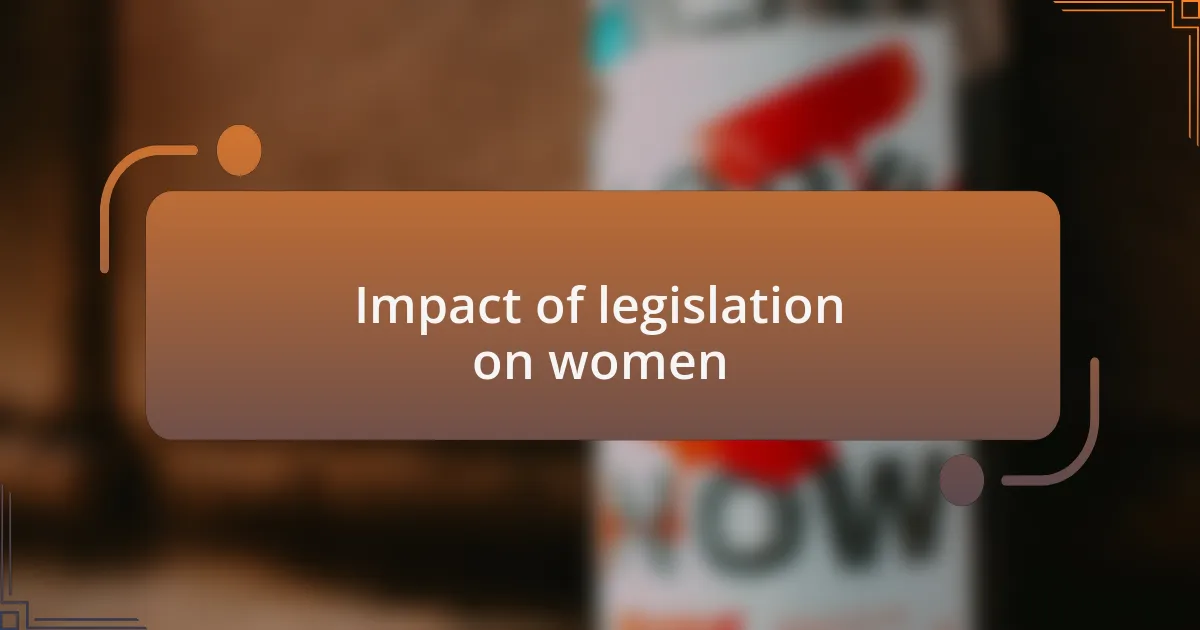
Impact of legislation on women
The impact of abortion legislation on women is more than just a legal issue; it often serves as a measure of societal respect for their autonomy. I remember a conversation with a woman who had to travel across state lines to access care due to restrictive laws in her area. Her frustration was palpable as she described how these barriers made her feel powerless in a situation where she sought to reclaim control over her own body.
Moreover, the emotional toll of navigating these laws can be overwhelming. I think back to a story I heard about a young woman who spent weeks in despair, unsure if she could manage the required waiting periods imposed by her state. This added delay wasn’t just a logistical hurdle; it intensified her feelings of anxiety and dread. How does one find clarity when every legal obstacle amplifies uncertainty?
Additionally, the ripple effects of such legislation extend beyond the individual experience. When I speak with community members, I often hear concerns about the stigma surrounding women who seek abortions. In such a polarized environment, are we inadvertently constructing a narrative that diminishes the complexities of women’s choices and experiences? These legislative frameworks can foster an atmosphere where women feel judged rather than supported, further complicating their already difficult decisions.
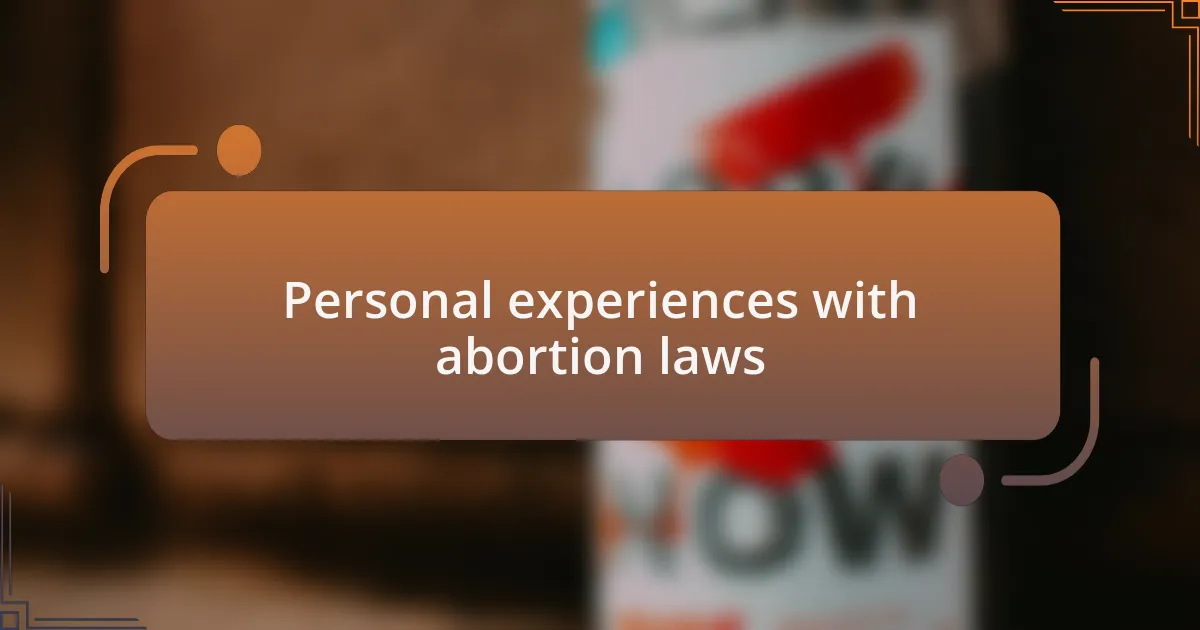
Personal experiences with abortion laws
Navigating abortion laws can feel like running a gauntlet. I remember meeting a woman who had carefully mapped out her options after discovering she was pregnant, only to find her chosen clinic closed due to new regulations. The disappointment in her voice as she recounted this experience left a mark on me. How had the legal landscape changed so drastically that access to necessary care became a matter of luck rather than a right?
In another conversation, a friend recounted her struggles with the forced waiting periods implemented in her state. She shared how those days felt interminable, with each tick of the clock amplifying her fear and doubt. It made me wonder: what kind of emotional resilience is needed to endure such a situation? The waiting didn’t just delay her decision; it complicated her mental state, as she grappled with the societal implications of her choice while feeling isolated in her struggle.
One poignant memory I have is of a young couple who shared their story of navigating restrictive laws. They spoke of how the constant fear of judgment and the pressure from their community weighed heavily on them—often leading to silence instead of support. Isn’t it ironic that seeking help during such a vulnerable time can sometimes feel more daunting than the decision itself? Their experience highlights how the interplay of law and personal choice can create not just logistical challenges, but emotional barriers that are equally difficult to overcome.
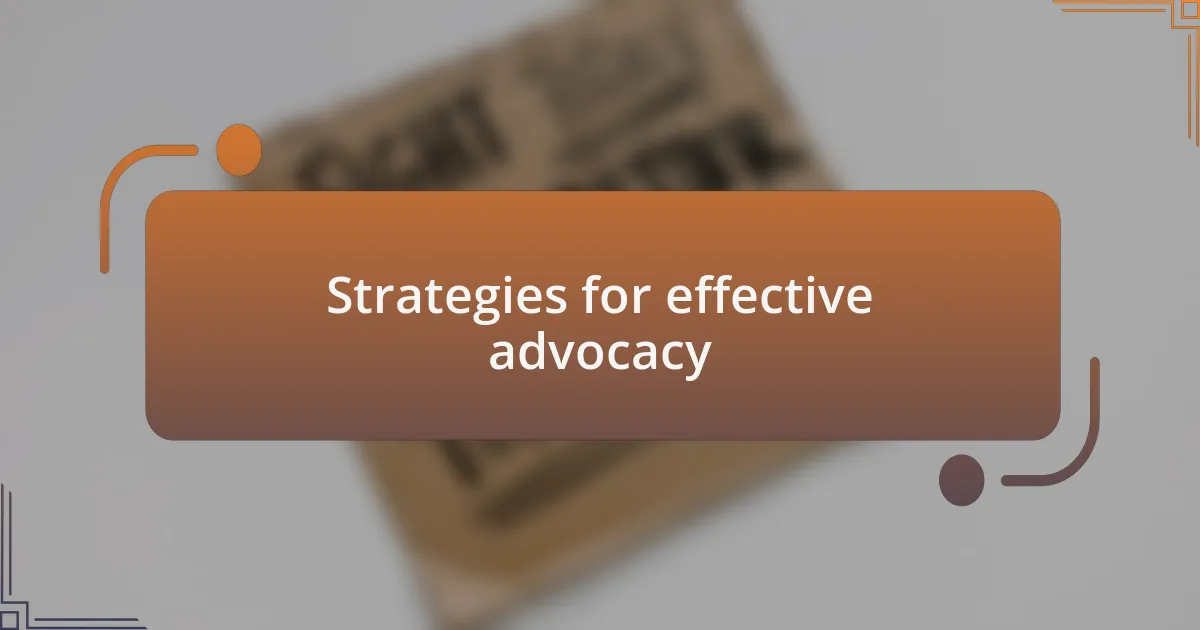
Strategies for effective advocacy
Advocacy is most effective when it’s rooted in genuine connection and understanding. I recall attending a local rally where individuals from various walks of life shared their stories. It was fascinating to see how personal narratives could resonate deeply, transforming abstract policy debates into heartfelt conversations that engaged even those who might not have initially been sympathetic to our cause.
One powerful strategy I’ve witnessed involves storytelling combined with education. During a community meeting, I saw advocates use statistics about reproductive health alongside poignant personal testimonies. This mix helped to demystify the issue, allowing people to see not just the data points, but the very real human experiences behind them. How often do we overlook the power of human connection in favor of raw statistics?
Another approach is fostering coalitions with other organizations dedicated to similar values. A few months ago, I collaborated with a group focused on women’s mental health. Together, we organized workshops designed to empower women with knowledge about their rights and options. This collaboration enriched our messages and expanded our reach, proving that advocacy thrives in community rather than isolation. How can we continue to build bridges and nurture diverse partnerships that might amplify our mission?
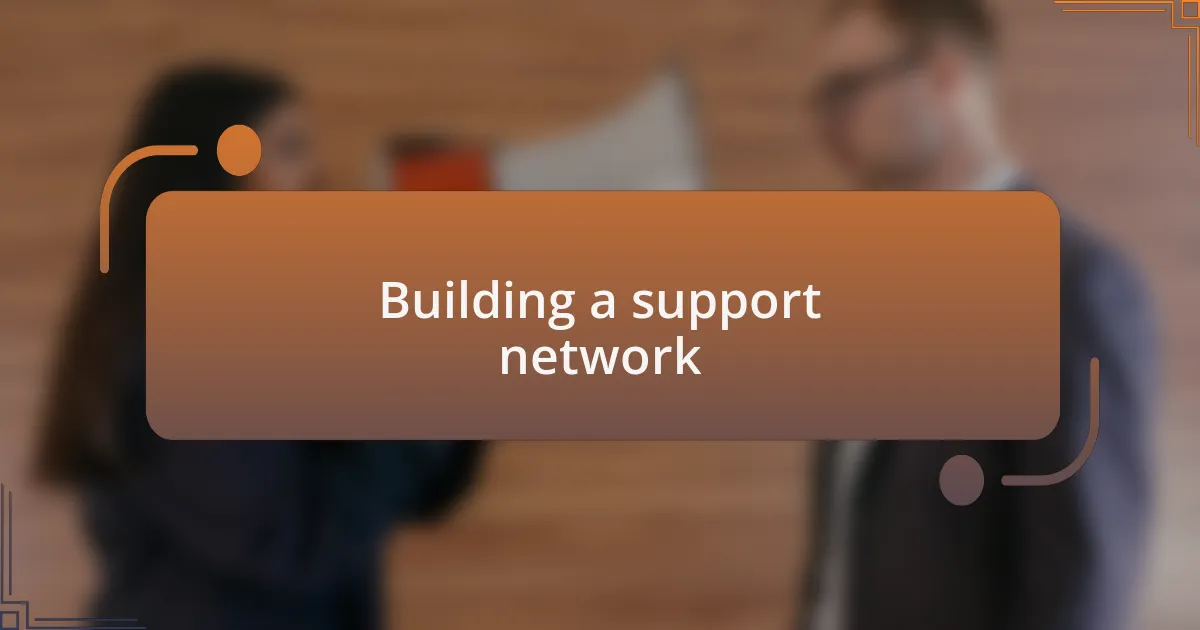
Building a support network
Creating a strong support network is essential in this journey. I remember when I first reached out to friends and family about my advocacy efforts; their encouragement made all the difference. Just having someone to listen and lend their support can bolster your confidence and resolve. Have you considered who in your life might stand by you during challenging times?
Connecting with like-minded individuals through local groups or online platforms can be incredibly empowering. One time, I joined a small community of advocates who met regularly to share insights and strategies. The collective wisdom in that room was palpable, and we often brainstormed ways to approach difficult conversations or navigate misunderstandings. How might your perspective shift when surrounded by others who share your passion?
Forming alliances with local organizations can also yield significant benefits. By partnering with a local shelter, I gained access to resources that enriched our discussions and provided practical help to those in need. This collaboration not only amplified our advocacy efforts but also fostered a sense of belonging. What partnerships can you explore to strengthen your impact within your community?
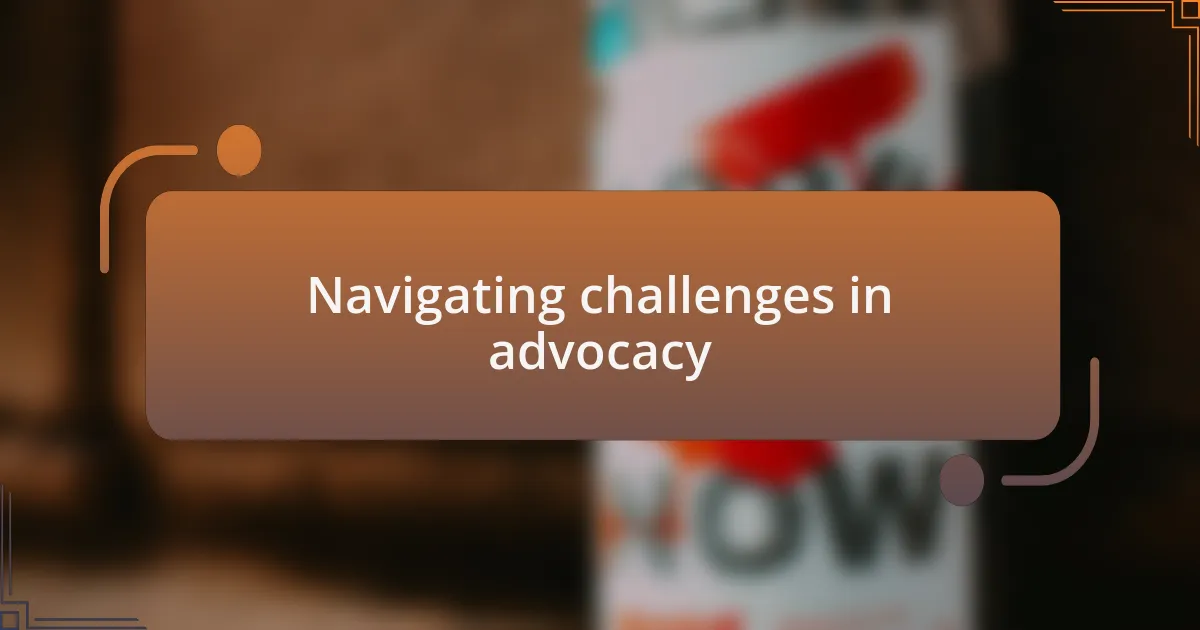
Navigating challenges in advocacy
Navigating challenges in advocacy can feel daunting, especially when faced with opposition or misunderstanding. I once encountered a situation where my views were met with hostility during a public forum. It was disheartening, but I learned that remaining calm and respectfully presenting my perspective can sometimes pave the way for constructive dialogue. Have you ever experienced a moment when your passion was met with resistance? How did you respond?
Another obstacle I faced was the overwhelming amount of misinformation surrounding the issue. I recall a discussion where a well-meaning friend shared inaccurate statistics that undermined our cause. This prompted me to dig deeper into credible sources and become better informed. By educating myself, not only could I correct misconceptions, but I also gained confidence in standing up for what I believe in. Have you found effective ways to address misinformation in your advocacy efforts?
Moreover, balancing time and resources can be challenging. There have been times when my commitments felt heavy, and I worried about my ability to make a meaningful impact. During one particularly busy week, I scheduled a small event, realizing that even a few hours dedicated to advocacy could ripple out into my community. Have you considered how small contributions can lead to significant change? Embracing incremental steps can often make the journey feel more manageable and fulfilling.